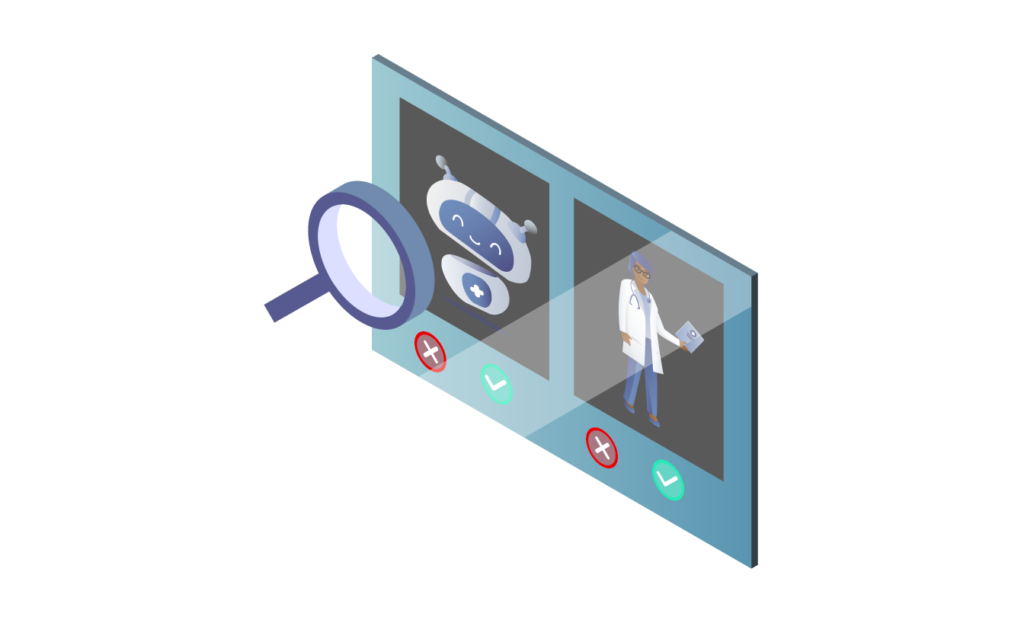AI-based diagnostic support in medicine with »Pneumo.AI«
»Pneumo.AI« is an AI-supported diagnostic software which supports medical professionals in the accurate identification of pneumonia using intelligent image recognition.
In which areas does the AI application offer the greatest benefit?
The »Pneumo.AI« demonstrator was developed to playfully illustrate the ways AI technologies and medical professionals can work together. The disease pneumonia, better known as lung inflammation, keeps specialized medical specialists busy in many hospitals. Until now, possible diseases had to be identified manually using X-ray images, among other things, to initiate appropriate treatment in good time. Today, image recognition systems can help with diagnosis. This not only saves time but can also prevent misjudgments.
What is pneumonia?
Pneumonia is an acute inflammation of the lower respiratory tract, commonly referred to as lung inflammation. Contrary to current belief, pneumonia is still a serious disease in many regions of the world today. In developing countries in particular, pneumonia is one of the most common causes of illness and death in children under the age of five.
How can AI help with diagnosis?
Artificial intelligence systems can support doctors in making a diagnosis. In this case, computer vision, i.e., machine vision, helps to recognize disease characteristics on chest scans.
What is the future of AI in medicine?
Both doctors and data scientists alike see great potential for AI in medicine. Many hospitals have large amounts of data available which could be used to improve diagnostic support. However, it is important that AI systems are only ever understood as assistance tools and that medical staff always remain in charge of decision-making. Also, medical data is highly sensitive and requires special protection.
What are »Pneumo.AI’s« quality characteristics?
- Low effort: Since the annotation of medical image datasets usually involves a great deal of effort, it is important to develop data-efficient algorithms to achieve the lowest possible annotation effort.
- Immediate analysis: The use of AI technologies allows for immediate evaluation of the scan/X-ray image after it has been taken – with no human interaction. This shows the potential to optimize work processes in clinics, for instance by developing a prioritization system. However, it is important that AI always serves as an assistance system for doctors and never makes decisions on its own.
- Secure data processing: For sensitive data such as patient data, it is essential that the AI processes used are secure. All data must be stored on German servers or may only be processed locally by medical specialists or in hospitals.
- Powerful AI: In the future, AI-based multimodal analysis will also play an important role in the evaluation of medical image data, as doctors will have a wide range of information available to them during the diagnostic process regarding the patient’s health status or the course of the disease.
»Close collaboration between medical experts and data scientists is the most important basis for the use of artificial intelligence in medicine.«
Which AI technology is used in the KI.NRW demonstrator?
The Pneumo.AI demonstrator is based on deep convolutional neural networks (CNNs), which are particularly well suited for processing large image data sets. This technology can also be transferred to other diseases and use cases.
In this type of machine learning, available prior knowledge and expert knowledge are integrated into the model to develop more data-efficient algorithms, for instance. For Pneumo.AI, the elements of bilateral symmetry of the lung field were considered within the modeling.
To ensure a good generalization capability of the trained network, various augmentation techniques are implemented. By rotating and zooming the training image data, the network achieves better performance and overfitting is avoided.
What does the AI demonstrator show?

The »Pneumo.AI« demonstrator shows how AI technologies can support doctors in practices and clinics in their everyday work in the future. It is important to emphasize that artificial intelligence is available to medical professionals as an assistance tool, but that the final decision remains with the human being. The demonstrator also illustrates the great potential of AI in medical image processing.
Request a non-binding consultation with our experts now!
Curious? Click here to go straight to the demonstrator!
Where can I find more information?
AI.Map featuring entries from the medical field
More AI providers, applications, and AI products »made in NRW« with the same AI focus can be found using the filter and search function of the AI.Map, which currently contains more than 1000 entries.
Lecture on Pneumo.AI at the MEDICA 2022 trade fair
At the international medical trade fair MEDICA 2022, KI.NRW and Fraunhofer IAIS gave a presentation on »Artificial intelligence in healthcare using the example of Pneumo.AI«.
SmartHospital: The use of AI in the hospital of the future
The KI.NRW flagship project SmartHospital.NRW aims at developing tools to support hospitals in their digital transformation and in the use of AI. Determine your hospital’s AI maturity level now.
Contact the team of developers

Helen Schneider
Data Scientist – Computer Vision
Fraunhofer IAIS
Schloss Birlinghoven
53757 Sankt Augustin
Phone +49 2241 14-2735

Dr. Rafet Sifa
Head of Cognitive Business Optimization
Fraunhofer IAIS
Schloss Birlinghoven
53757 Sankt Augustin
Phone +49 2241 14-2405
